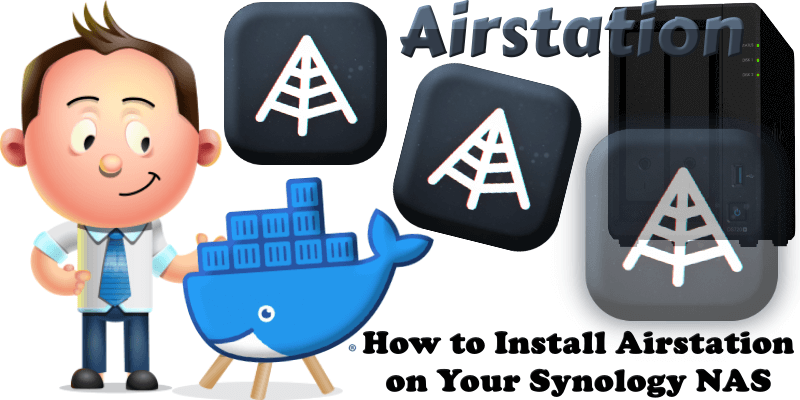
Airstation is a self-hosted web app for streaming music over the Internet. It features a simple interface for uploading tracks and managing the playback queue, along with a minimalistic player for listeners. Under the hood, it streams music over HTTP using HLS, stores data in SQLite, and leverages FFmpeg for audio processing — all packaged in a compact Docker container for easy deployment. In this step by step guide I will show you how to install Airstation on your Synology NAS using Docker & Portainer.
STEP 1
Please Support My work by Making a Donation.
STEP 2
Install Portainer using my step by step guide. If you already have Portainer installed on your Synology NAS, skip this STEP. Attention: Make sure you have installed the latest Portainer version.
STEP 3
Make sure you have a synology.me Wildcard Certificate. Follow my guide to get a Wildcard Certificate. If you already have a synology.me Wildcard certificate, skip this STEP.
STEP 4
Go to Control Panel / Login Portal / Advanced Tab / click Reverse Proxy. Follow the instructions in the image below.
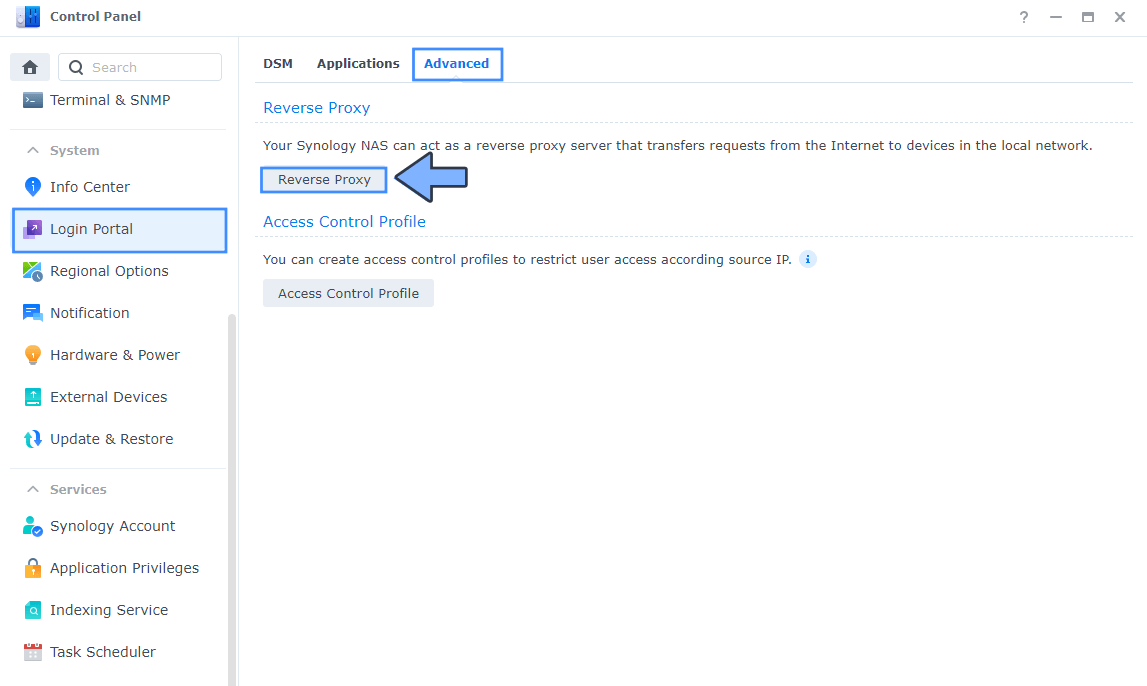
STEP 5
Now click the “Create” button. Follow the instructions in the image below.
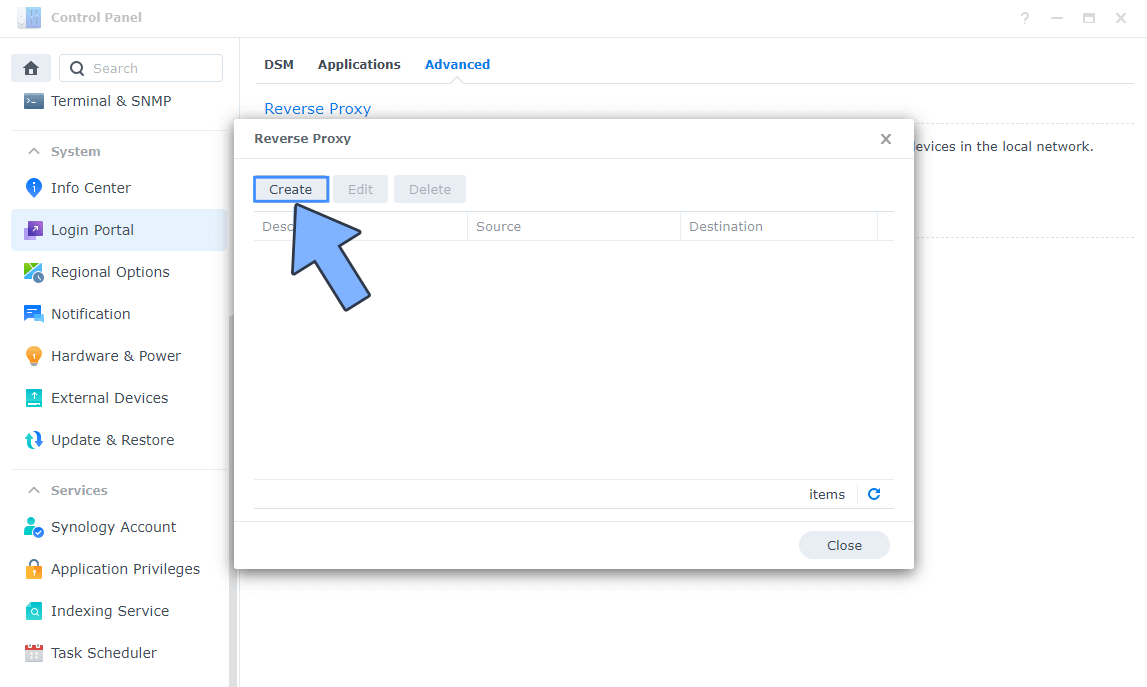
STEP 6
After you click the Create button, the window below will open. Follow the instructions in the image below.
On the General area, set the Reverse Proxy Name description: type in Airstation. After that, add the following instructions:
Source:
Protocol: HTTPS
Hostname: airstation.yourname.synology.me
Port: 443
Check Enable HSTS
Destination:
Protocol: HTTP
Hostname: localhost
Port: 7331
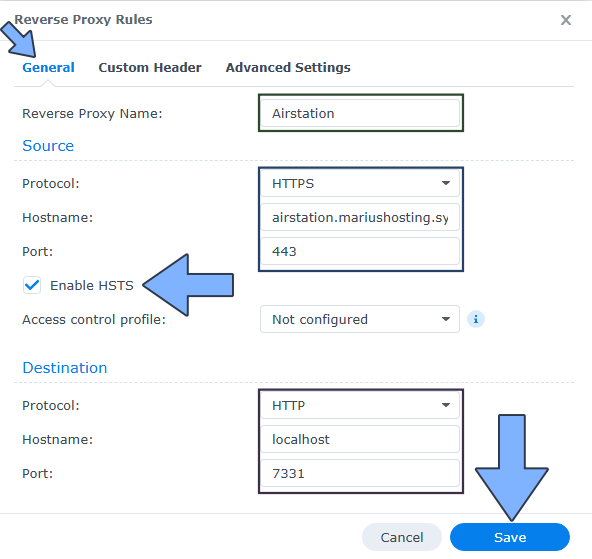
STEP 7
On the Reverse Proxy Rules click the Custom Header tab. Click Create and then, from the drop-down menu, click WebSocket. After you click on WebSocket, two Header Names and two Values will be automatically added. Click Save. Follow the instructions in the image below.

STEP 8
Go to Control Panel / Network / Connectivity tab/ Check Enable HTTP/2 then click Apply. Follow the instructions in the image below.
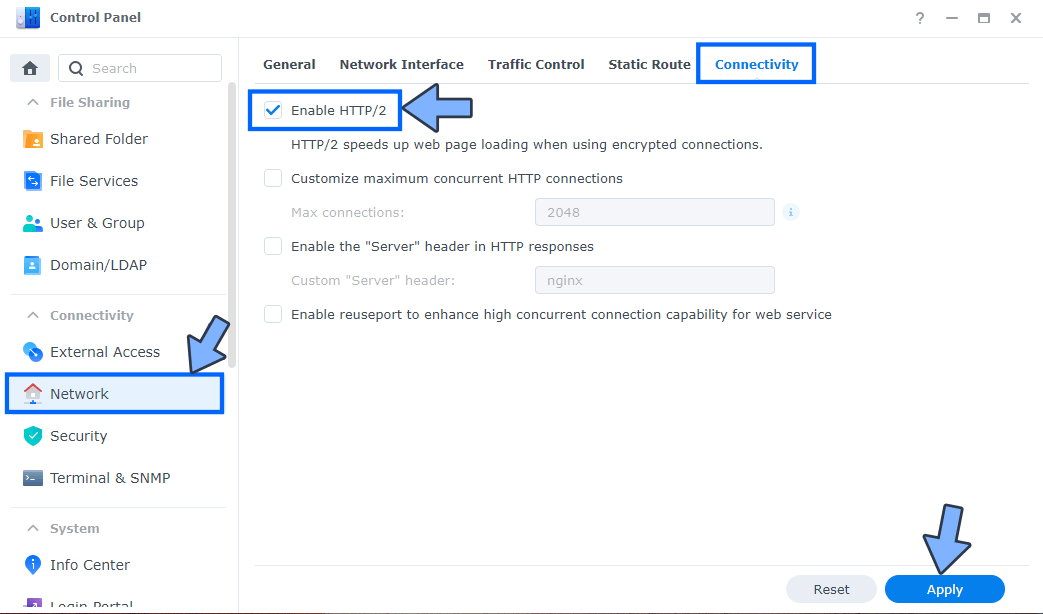
STEP 9
Go to Control Panel / Security / Advanced tab/ Check Enable HTTP Compression then click Apply. Follow the instructions in the image below.
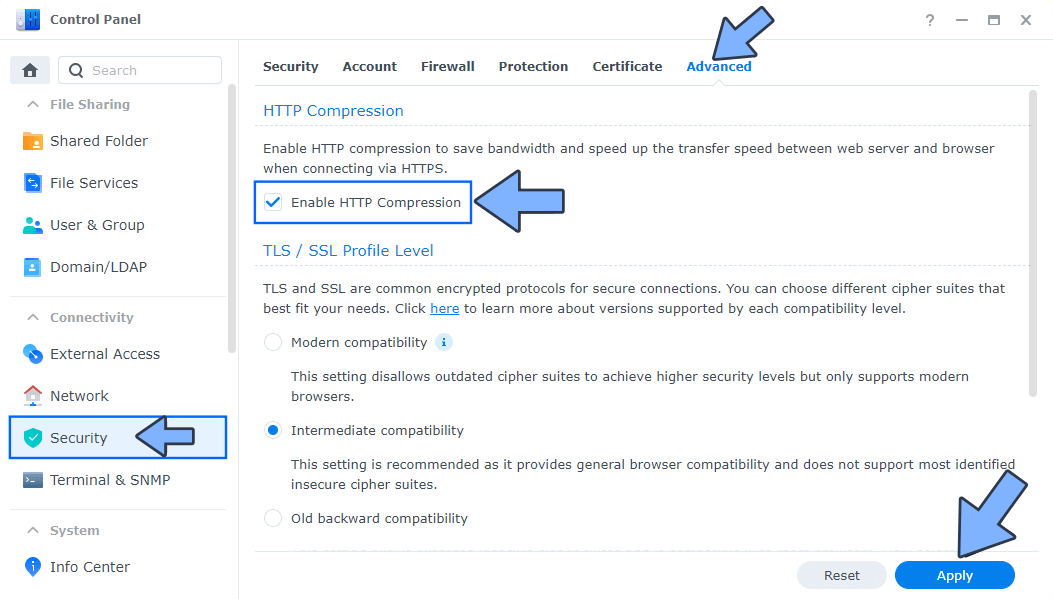
STEP 10
Go to File Station and open the docker folder. Inside the docker folder, create one new folder and name it airstation. Follow the instructions in the image below.
Note: Be careful to enter only lowercase, not uppercase letters.
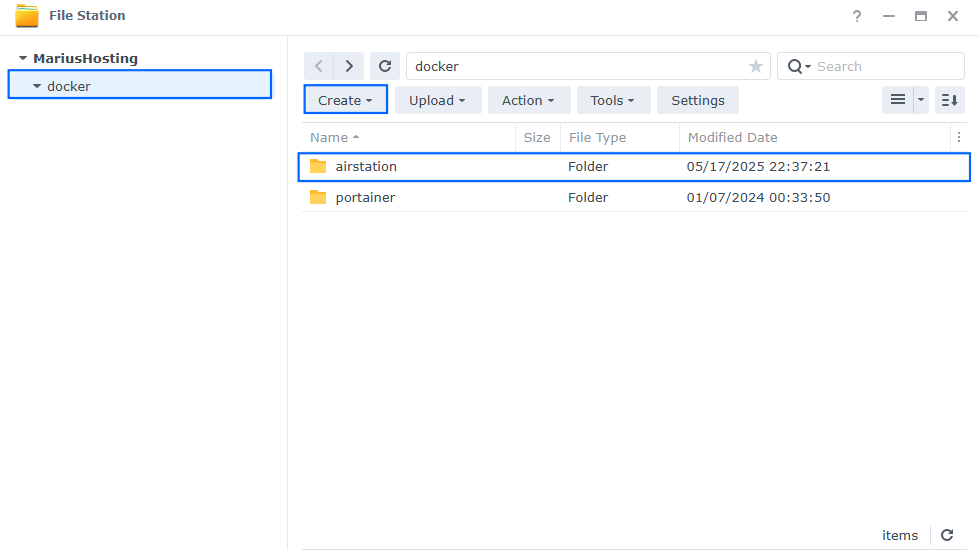
STEP 11
Now create two new folders inside the airstation folder that you have previously created at STEP 10 and name them data and static. Follow the instructions in the image below.
Note: Be careful to enter only lowercase, not uppercase letters.
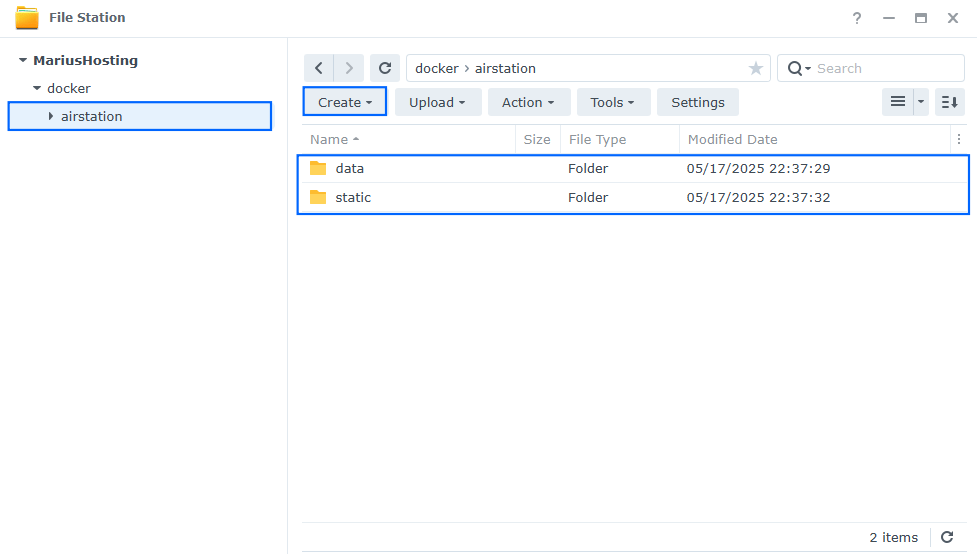
STEP 12
Log into Portainer using your username and password. On the left sidebar in Portainer, click on Home then Live connect. Follow the instructions in the image below.

On the left sidebar in Portainer, click on Stacks then + Add stack. Follow the instructions in the image below.

STEP 13
In the Name field type in airstation. Follow the instructions in the image below.
services:
airstation:
image: cheatsnake/airstation:latest
container_name: Airstation
healthcheck:
test: ["CMD-SHELL", "nc -z 127.0.0.1 7331 || exit 1"]
interval: 10s
timeout: 5s
retries: 3
start_period: 90s
ports:
- 7331:7331
volumes:
- /volume1/docker/airstation/data:/app/storage:rw
- /volume1/docker/airstation/static:/app/static:rw
environment:
AIRSTATION_SECRET_KEY: dOxZYTTZgXKMHkqLBIQVImayQXAVWdzGBPuFJKggzcgvgPJPXpWzqzKaUOIOGGIr
AIRSTATION_JWT_SIGN: LWpPZTOilFGAxBHoaTRqRPAEKXpVLUTUCodRDSRpMDCkxFdAyCIiVhkXaKHZwEBc
restart: on-failure:5
Note: Before you paste the code above in the Web editor area below, change the value for AIRSTATION_SECRET_KEY. (Generate your own Random 64 length AIRSTATION_SECRET_KEY.) Note: You will need the AIRSTATION_SECRET_KEY later at STEP 17.
Note: Before you paste the code above in the Web editor area below, change the value for AIRSTATION_JWT_SIGN. (Generate your own Random 64 length AIRSTATION_JWT_SIGN.)
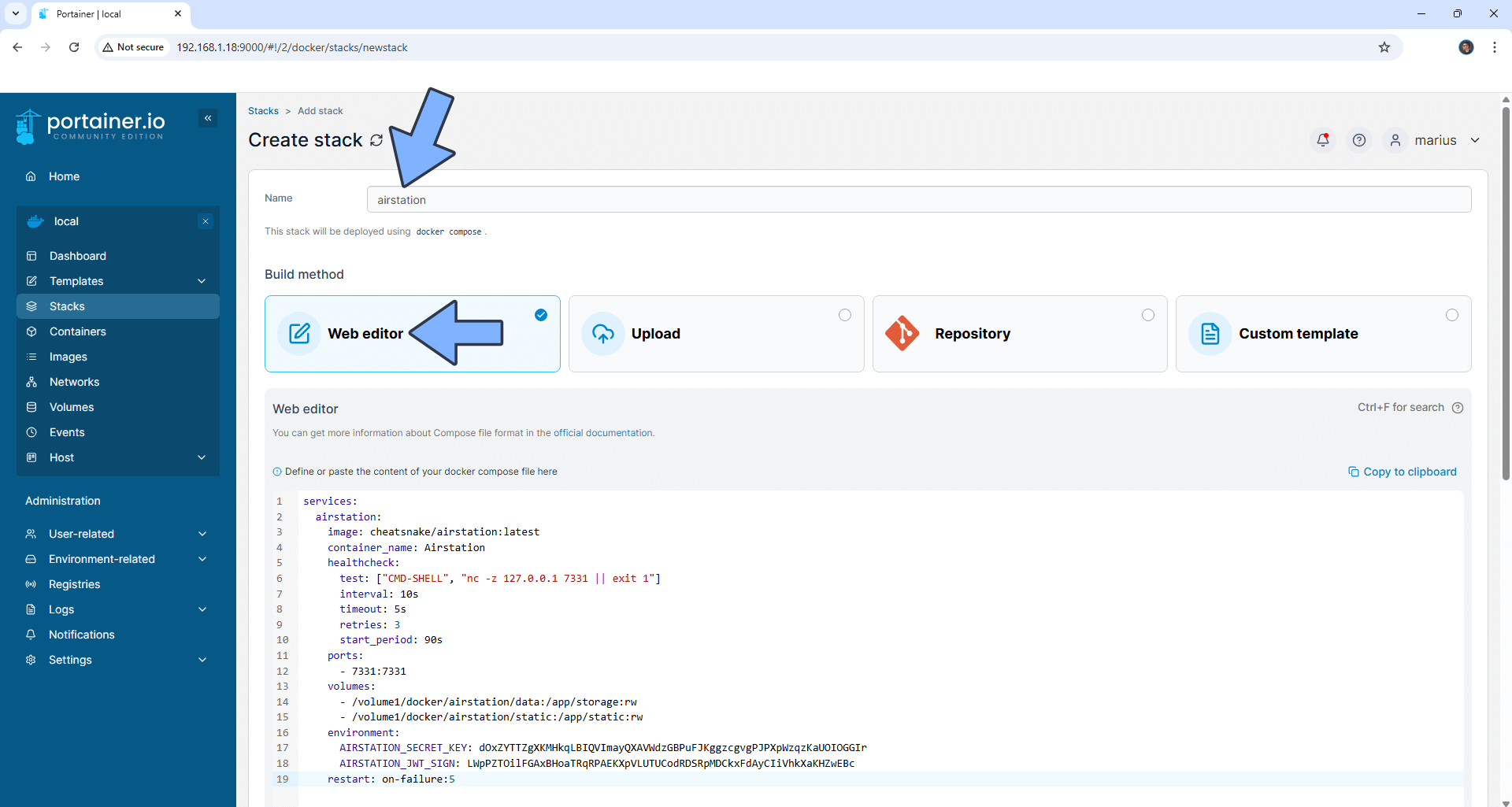
STEP 14
Scroll down on the page until you see a button named Deploy the stack. Click on it. Follow the instructions in the image below. The installation process can take up to a few minutes. It will depend on your Internet speed connection.
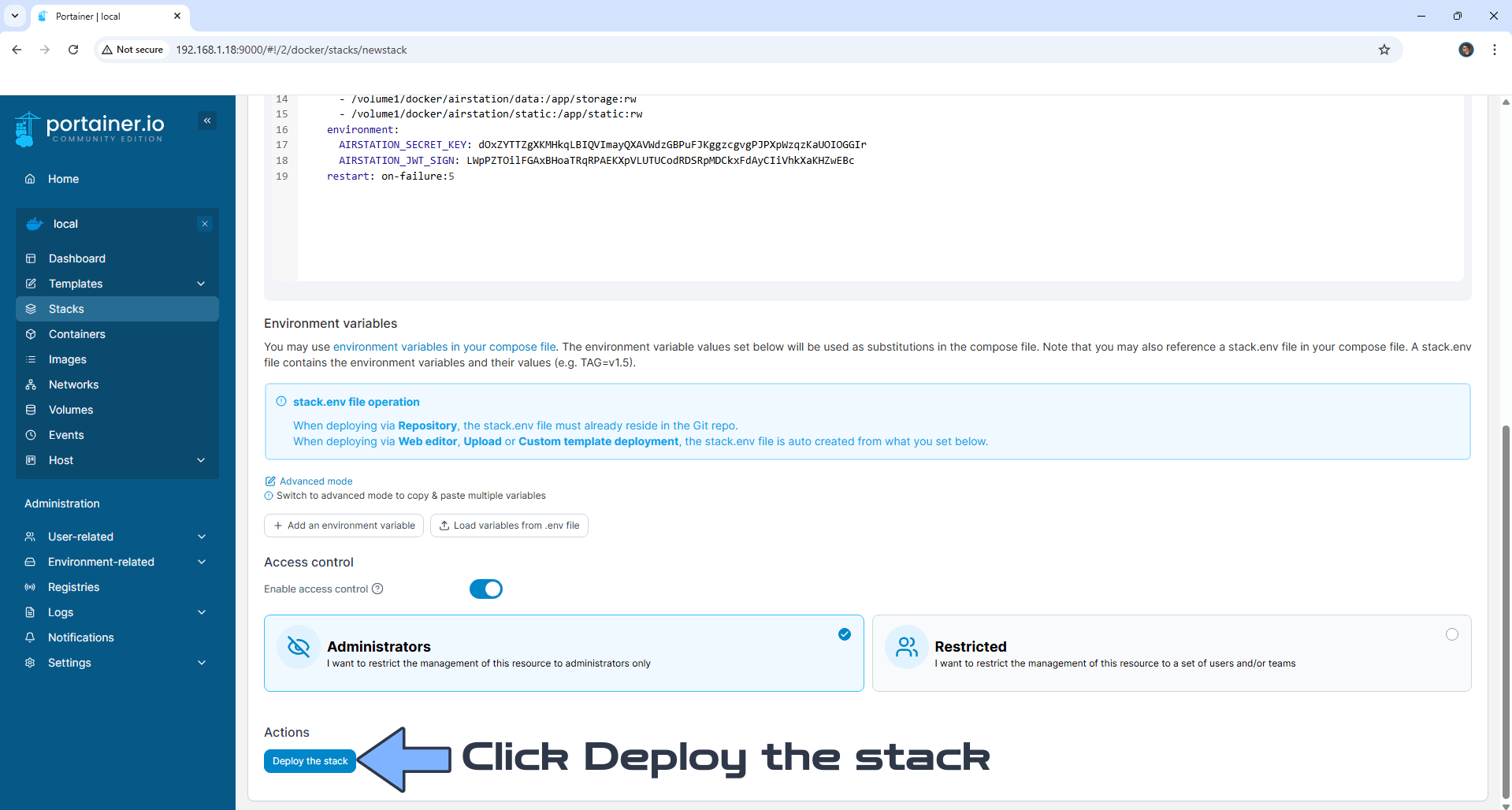
STEP 15
If everything goes right, you will see the following message at the top right of your screen: “Success Stack successfully deployed“.

STEP 16
🟢Please Support My work by Making a Donation. Almost 99,9% of the people that install something using my guides forget to support my work, or just ignore STEP 1. I’ve been very honest about this aspect of my work since the beginning: I don’t run any ADS, I don’t require subscriptions, paid or otherwise, I don’t collect IPs, emails, and I don’t have any referral links from Amazon or other merchants. I also don’t have any POP-UPs or COOKIES. I have repeatedly been told over the years how much I have contributed to the community. It’s something I love doing and have been honest about my passion since the beginning. But I also Need The Community to Support me Back to be able to continue doing this work.
STEP 17
Now open your browser and type in your HTTPS/SSL certificate like this https://airstation.yourname.synology.me/studio/ In my case it’s https://airstation.mariushosting.synology.me/studio/ In the Password field, type in your AIRSTATION_SECRET_KEY that you have previously added at STEP 13. Click Submit. Follow the instructions in the image below.
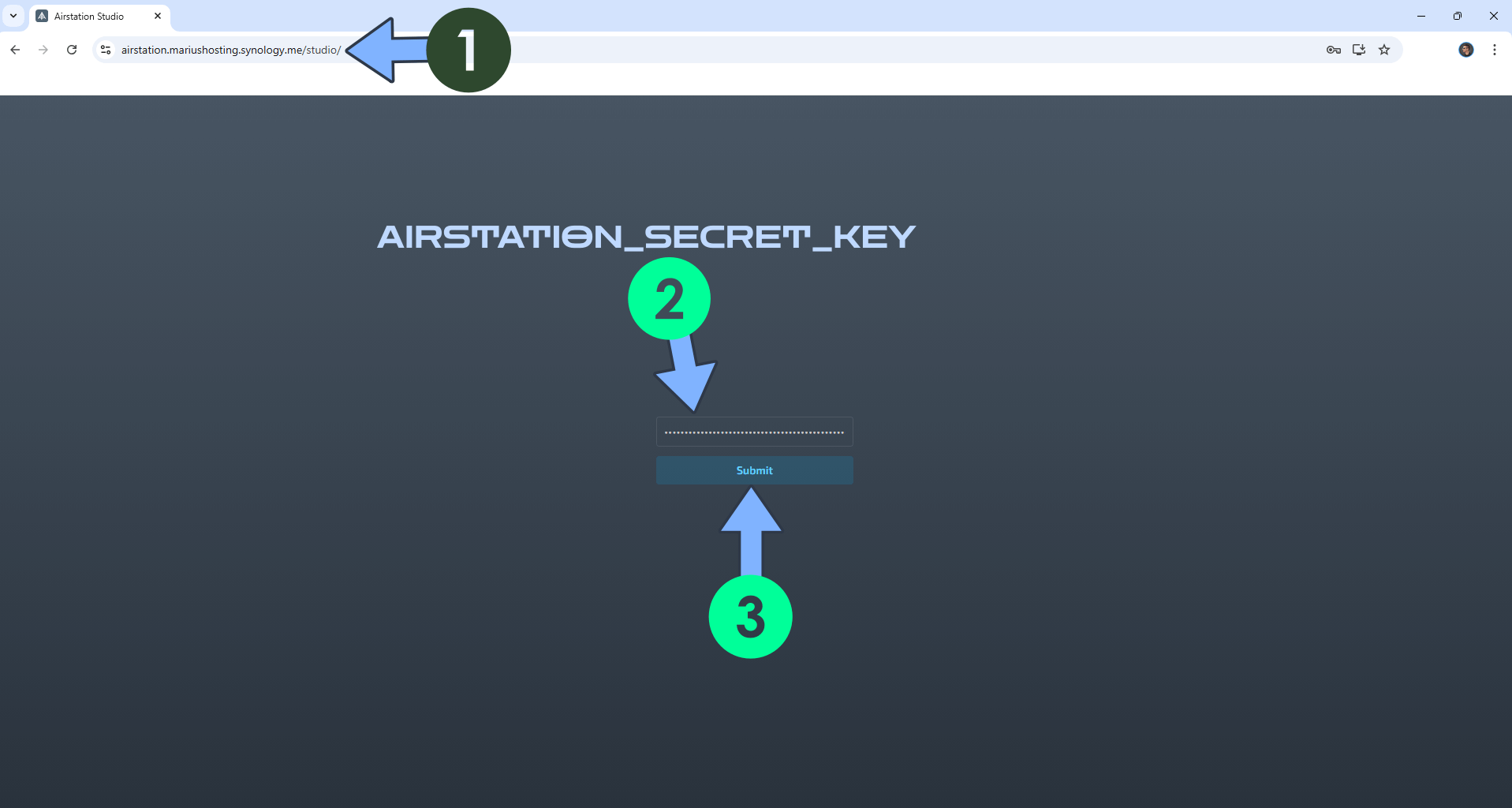
STEP 18
Click Add to upload your music. Wait a few minutes until the files are processed. The process can take longer depending on how many files you have uploaded. Once the files are processed, check them, then click Queue. Follow the instructions in the image below.
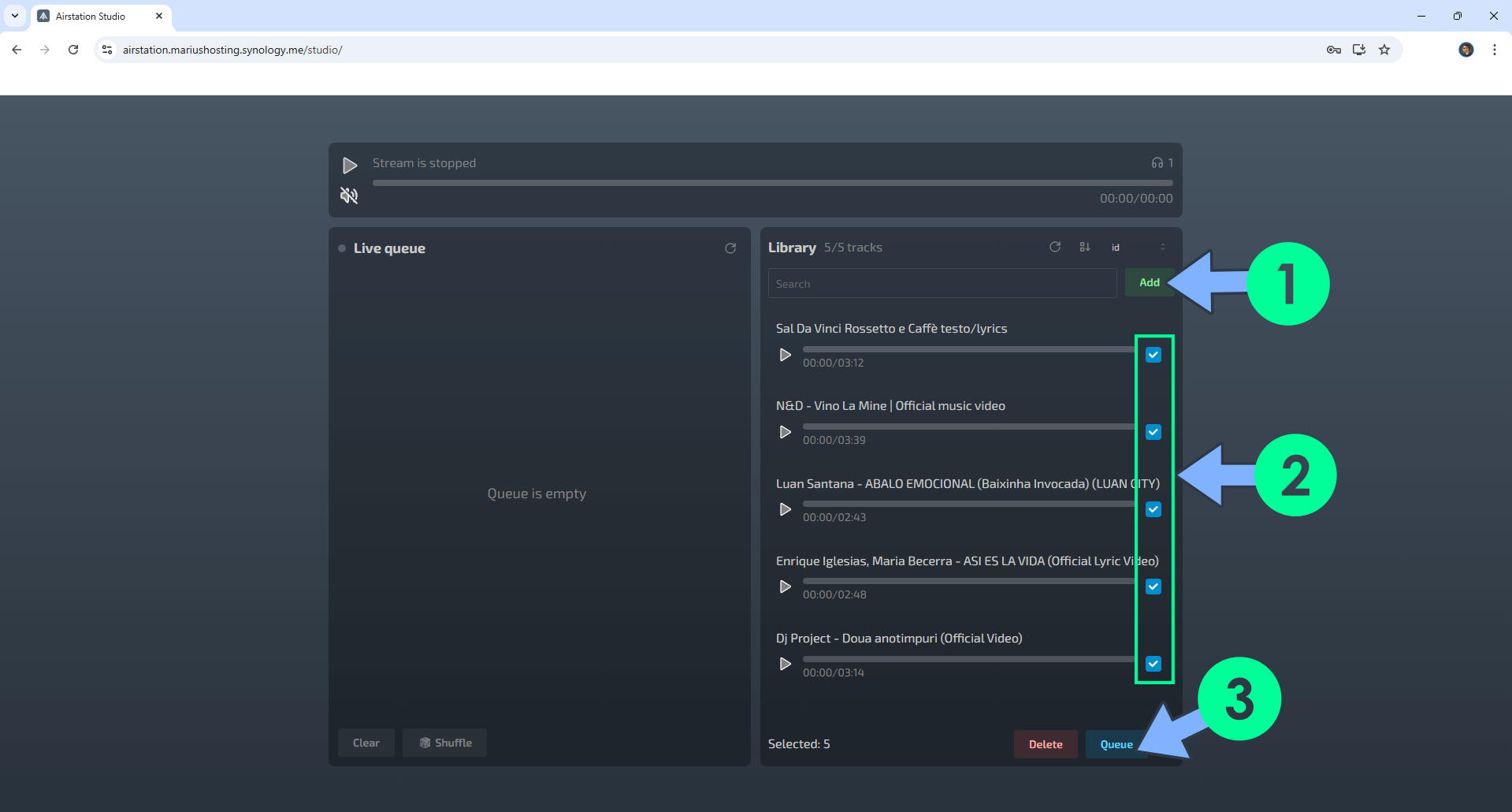
STEP 19
At the top left of the page, click the play icon to start streaming your live music!
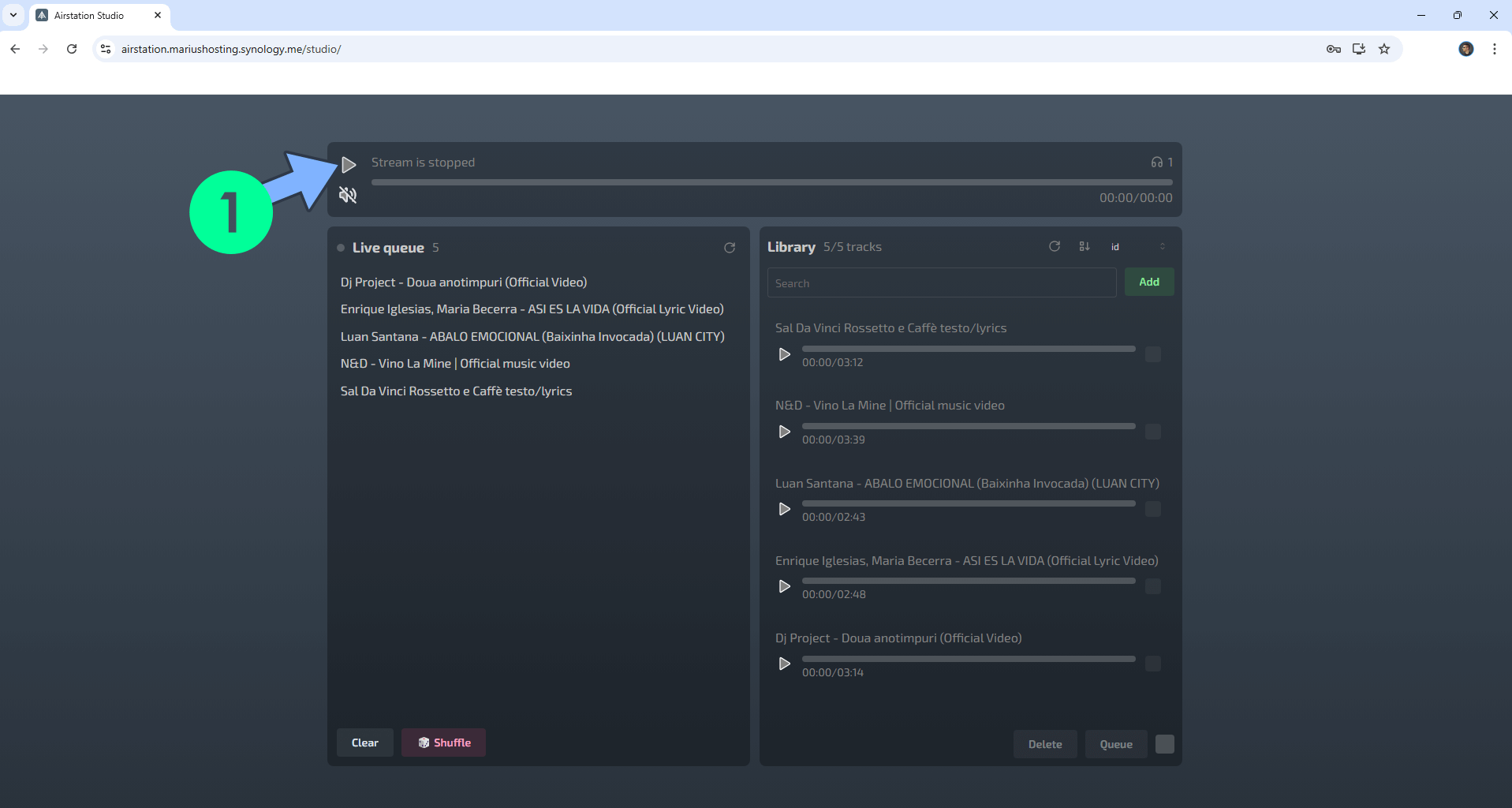
STEP 20
Remove the /studio/ part from your DDNS link, and share your streaming link with your friends!
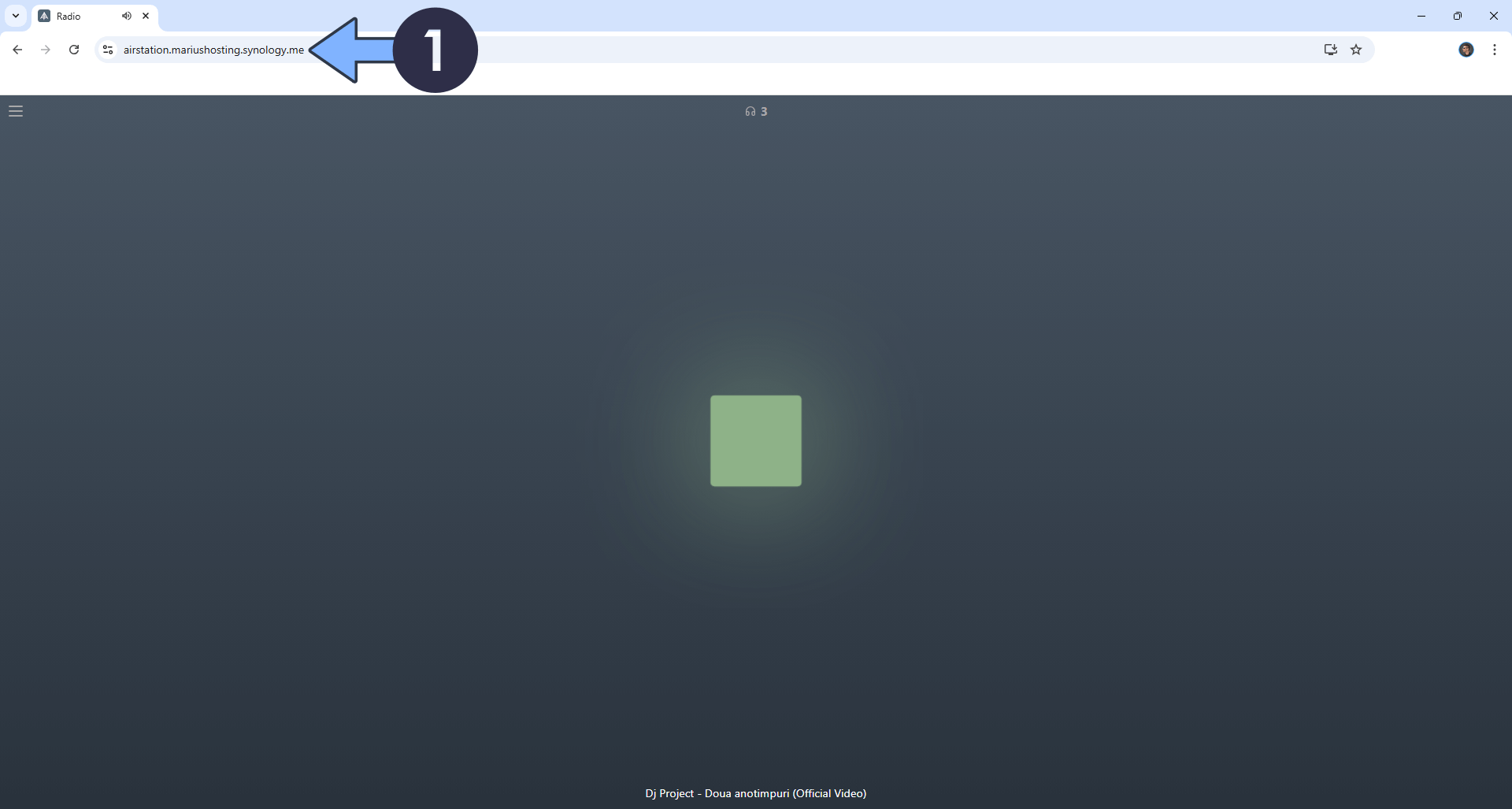
Enjoy Airstation!
If you encounter issues by using this container, make sure to check out the Common Docker issues article.
Note: Find out how to update the Airstation container with the latest image.
Note: How to Back Up Docker Containers on your Synology NAS.
Note: Can I run Docker on my Synology NAS? See the supported models.
Note: How to Free Disk Space on Your NAS if You Run Docker.
Note: How to Schedule Start & Stop For Docker Containers.
Note: How to Activate Email Notifications.
Note: How to Add Access Control Profile on Your NAS.
Note: How to Change Docker Containers Restart Policy.
Note: How to Use Docker Containers With VPN.
Note: Convert Docker Run Into Docker Compose.
Note: How to Clean Docker.
Note: How to Clean Docker Automatically.
Note: Best Practices When Using Docker and DDNS.
Note: Some Docker Containers Need WebSocket.
Note: Find out the Best NAS Models For Docker.
Note: Activate Gmail SMTP For Docker Containers.
This post was updated on Sunday / December 21st, 2025 at 2:17 PM
